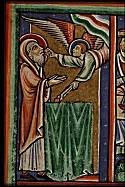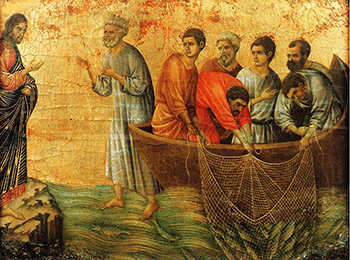From Our Archives
Debie Thomas, I Saw the Lord (2022); Debie Thomas, Same Old Same Old (2019).
This Week's Essay
Psalm 138:6, "Though the Lord is exalted, He regards the lowly."
For Sunday February 9, 2025
Lectionary Readings (Revised Common Lectionary, Year C)
Psalm 138
1 Corinthians 15:1–11
Luke 5:1–11
This week the four lectionary readings align almost perfectly. When we listen to the psalmist, Isaiah, Paul, and Peter reflect on their human frailty before a transcendent God, we hear a singular theme. It's a theme that Saint Augustine once confessed with equal parts fear and consolation: "Lord, what I am for you terrifies me. What I am with you consoles me. For you, I am a priest. With you, I am a Christian."
According to the psalmist, God in heaven is "highly exalted above all things." His glory is unsurpassed, and so it is only right that he "bows down" before Him, and that "all the kings of the earth" acknowledge him. Though this transcendent God lives "on high," he is also immanent — He's a loving God who answers prayers, delivers from trouble, and "regards the lowly."
When the prophet Isaiah had a vision of Yahweh in the temple, dread and terror overwhelmed him: "Woe to me! I am ruined! For I am a man of unclean lips, and my eyes have seen the King, the Lord Almighty." Isaiah was one of the most gifted poets in ancient history; even today people who are unfamiliar with the Bible recognize his verse in music like Handel's Messiah. But the billowing smoke, thundering voices, and earthquake that he saw caused Isaiah to repudiate his literary brilliance. His vision reads like a science fiction horror story when an angel takes a burning coal from the altar with a pair of tongs and sears his lips, the very source of his poetic eloquence.
When the apostle Paul contemplated how violently he tried to exterminate the early Jesus movement, painful memories evoked feelings of deep regret: "I am the least of all the apostles and do not even deserve to be called an apostle," he wrote to the Corinthians. In seven autobiographical flashbacks on his pre-conversion life, Paul describes how he imprisoned many disciples, dragged them to Jerusalem for punishment, expended every effort to force them to blaspheme, favored the death penalty for them, and opposed the name of Jesus with all his might.1 Whereas he once boasted of his religious orthodoxy, he later repudiated it as the worst form of self-righteous zealotry. Even late in his life Paul lamented to his young protege Timothy, "I am the worst of sinners" (present tense). Only the "unlimited patience" of God helped him to move beyond the deep regret of his painful past.
 |
|
An angel purifies Isaiah's
lips (12th century). |
When the fisherman Peter worked hard all night and caught nothing, but then obeyed Jesus's command to sink his nets into deeper waters, he hauled in a catch of fish that ripped their nets and nearly sunk their boat. When he realized what had happened, when he grasped the inverse relationship between the power of God and his paltry faith, he recoiled before Jesus in fear: "Lord, depart from me, for I am a sinful man!" (Luke 5:8). Peter had other occasions to make this confession. When he rebuked Jesus for predicting his suffering and death, Jesus called Peter "satan" (Matthew 16:23). After denying that he would deny Jesus, and then doing so three times, Peter "wept bitterly" (Luke 22:62). Decades later, Paul publicly rebuked Peter for his blatant hypocrisy when he backpedaled over eating with ritually impure Gentiles (Galatians 2:11–13).
The upshot of these four texts is that our frailty, failure, and inadequacy are not obstacles to God's love. He doesn't require a perfect messenger for his message. And so, embracing rather than denying our brokenness is the path of liberation. It's an act of candid self-awareness and not misanthropic self-hatred. By it we move from illusion and self-justification to reality and self-acceptance. In our most honest moments of self-awareness we can still offer ourselves to God like Isaiah, "Here am I, send me."
Without hedging our bets or making excuses, we can imitate Peter, James, John, and their companions who, in the gospel for this week, "pulled their boats up on shore, left everything, and followed Jesus." We can rejoice with Paul that "by the grace of God I am what I am." Most important of all, to Isaiah's dread, Paul's deep regrets and painful memories, Peter's fears, and to our own personal insecurities today, God whispers to us what Jesus said to Peter: "Don't be afraid" (Luke 5:10).
George Herbert (1593–1633) was born to wealth and power. After graduation from Cambridge, he distinguished himself as the university's Public Orator and a member of Parliament. But at the age of thirty-six, despite the objections of his friends who said that he was wasting his life, Herbert renounced his life of privilege and became the priest at Bemerton, a rural village near Salisbury. In Bemerton he preached, served the pastoral needs of his people with loving distinction, cared for the poor, and helped to rebuild the church using his own resources. Four years later, a month before his fortieth birthday, Herbert died of tuberculosis.
|
|
|
Andrei Rublev icon of Paul, c. 1420.
|
Herbert also wrote poetry, although none of his poems had been published when he died. Upon his deathbed he asked his friend Nicholas Ferrar to publish them only if they might help “any dejected poor soul.” Ferrar did publish the poems under the title The Temple, and they became an enormous success. Published in 1633, by 1680 the book had gone through 13 editions.
What attracts many readers to Herbert's poetry today is not only their literary elegance but his vivid depictions of his lifelong struggles between his privileged background, his worldly ambitions, his deep sense of inadequacy, and our unconditional embrace by a loving God. Consider his sonnet Affliction (IV):
Broken in pieces all asunder,
Lord, hunt me not,
A thing forgot,
Once a poor creature, now a wonder,
A wonder tortur’d in the space
Betwixt this world and that of grace.My thoughts are all a case of knives,
Wounding my heart
With scatter’d smart,
As wat’ring pots give flowers their lives.
Nothing their fury can control,
While they do wound and prick my soul.All my attendants are at strife,
Quitting their place
Unto my face:
Nothing performs the task of life:
The elements are let loose to fight,
And while I live, try out their right.Oh help, my God! let not their plot
Kill them and me,
And also thee,
Who art my life: dissolve the knot,
As the sun scatters by his light
All the rebellions of the night.Then shall those powers, which work for grief,
Enter thy pay,
And day by day
Labour thy praise, and my relief;
With care and courage building me,
Till I reach heav’n, and much more, thee.
 |
|
Duccio, Miraculous Catch of Fish, 14th century.
|
Herbert knew what the psalmist, Isaiah, Paul, and Peter knew, that however unworthy we feel before the highly exalted God, His limitless love is greater still. Or as Paul once said, "where sin abounds, grace abounds all the more." (Romans 5:20).
[1] For Paul's seven autobiographical references see Acts 9:1–2, 22:3–5, 26:9–11, 1 Corinthians 15:9–11, Galatians 1:9–11, Ephesians 3:8, and 1 Timothy 1:12–17.
Weekly Prayer
C.S. Lewis
He whom I bow to only knows to whom I bow
When I attempt the ineffable Name, murmuring Thou,
And dream of Pheidian fancies and embrace in heart
Symbols (I know) which cannot be the thing Thou art.
Thus always, taken at their word, all prayers blaspheme
Worshiping with frail images a folk-lore dream,
And all men in their praying, self-deceived, address
The coinage of their own unquiet thoughts, unless
Thou in magnetic mercy to Thyself divert
Our arrows, aimed unskillfully, beyond desert;
And all men are idolaters, crying unheard
To a deaf idol, if Thou take them at their word.
Take not, O Lord, our literal sense. Lord, in thy great
Unbroken speech our limping metaphor translate.C.S. Lewis (1898–1963) was a Professor of Medieval and Renaissance Literature at Oxford and Cambridge universities. In 2013, on the 50th anniversary of his death, he was honored with a memorial stone in the Poets’ Corner of Westminster Abbey, alongside Chaucer, Shakespeare, Milton, Handel, Dickens, and many others.
Dan Clendenin: dan@journeywithjesus.net
Image credits: (1) Biblical-Art.com; (2) Abcgallery.com; and (3) Wikimedia.org.





